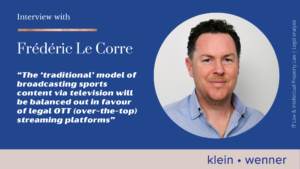
Frédéric Le Corre (a specialist in the sports ecosystem and co-founder of Whimup, a social fan–experience platform) goes back in detail, for La Lettre du DPO, on his career and provides his views on the future of sports content broadcasting in the digital world.
1/- What is your background and what led you to take an interest in digital technology and data?
” I have a postgraduate degree in Sports Economics (Grenoble University) and a business school diploma (Brest). I am an avid fan of sports and have built up my career in the sports ecosystem. Within para-public structures, I have led multi-business missions for the organisation of major events in France (World Cycling Championships in 2000, World Athletics Championships in 2003, Rugby World Cup 2007) and on an international level (European Figure Skating Championships 2003, Winter Olympic Games 2006 in Italy, Asian Games 2006 in Qatar, FIFA Club World Cup 2009 in Abu Dhabi, World Swimming Championships 2010 in Dubai, CAN (African Cup of Nations football championship) 2012 and 2017 in Gabon). I have also worked in consulting and marketing agencies (Marketing Manager at Havas Sports Italy and Project Director at Keneo).
During the organisation of the last CAN football championship, I was appointed General Coordinator of the event (4 venues and +350,000 spectators). It was then that I became aware of the gap existing in the fan experience between what we proposed and the potential that digital technology could generate in terms of commitment and monetisation. But between the maturation of the idea and the development of a solution to this problem, a few years have passed…
After taking over and consolidating two digital advertising companies, I co-founded Whimup with a team of partners having complementary profiles. It is a social fan-experience platform, with the aim of addressing the issues outlined above! Our promise is to put fans at the heart of the action by gamifying their experience and generating new revenues for clubs. It is this project that led me to take a closer interest in digital technology and data. “
2/- What are your responsibilities and the missions you carry out, in particular at the moment ?
” Released, since the beginning of this year, from dealing with the operational side of the Wijoo group co-founded in 2019, of which I am president, I am seeking opportunities to grow and diversify. For Whimup, I took over the start-up after a period of maturation and development of the commercial concept. More specifically, I am currently approaching professional clubs to present them with the prototype that came out at the beginning of the year. The groundwork has been laid for a market launch of the application in July this year, at the start of the 2023/2024 season.
We are currently in the process of contracting our first club clients, recruiting our first team members to complete the team already in place, and have launched the fundraising process. We have three priority issues:
- to demonstrate the relevance of commitment mechanisms through gamification of the experience;
- to monetise the target audience of digital fans through soft levers and the distribution of innovative virtual items;
- to enhance the data generated within the application.
The digital world and the targeting of Generation Z constantly lead to new thinking and a certain number of daily challenges that we have to confront with our legal framework.”
3/- How do you see the future of the digital economy, in particular as regards the distribution of content?
“I think that the “traditional” model of broadcasting sports content via television will be balanced out in favour of legal OTT (over-the-top) streaming platforms, for various reasons:
- the overabundance of advertising in downtime, which could be filled by entertaining or higher value-added content (statistics, short video clips, etc.) ;
- the cost of accessing sports events televised on traditional channels;
- the need of younger generations to consume sport differently (“snacking”, “zapping”, “scrolling”, etc.);
- the emergence of new platforms that offer quality sports content (level of visual and sound production, level and reputation of journalists and consultants, etc.) and affordable subscriptions (e.g. Amazon, with the French Ligue 1);
- the possibility via the Internet of easily integrating content generated by other channels (online games, fan interaction, statistical tools, targeted advertising, etc.).
In a few years’ time, the proportion of people watching the Olympic Games or the Football World Cup on their smartphones is expected to exceed television audiences, thanks to enriched content and permanent quality access to content (5G coverage with no latency and reduced energy consumption).
We can even envisage a new revolution in the consumption of sporting events when fan-generated and already experimental player-generated content will be distributed via these platforms (the activity of which is increasingly regulated, notably by the Digital Markets Act (DMA) and the Digital Services Act (DSA) which limit the economic domination of the large platforms and the online distribution of illegal content and products) and will generate new forms of interaction. In any case, this is the bet we are making at Whimup! “.